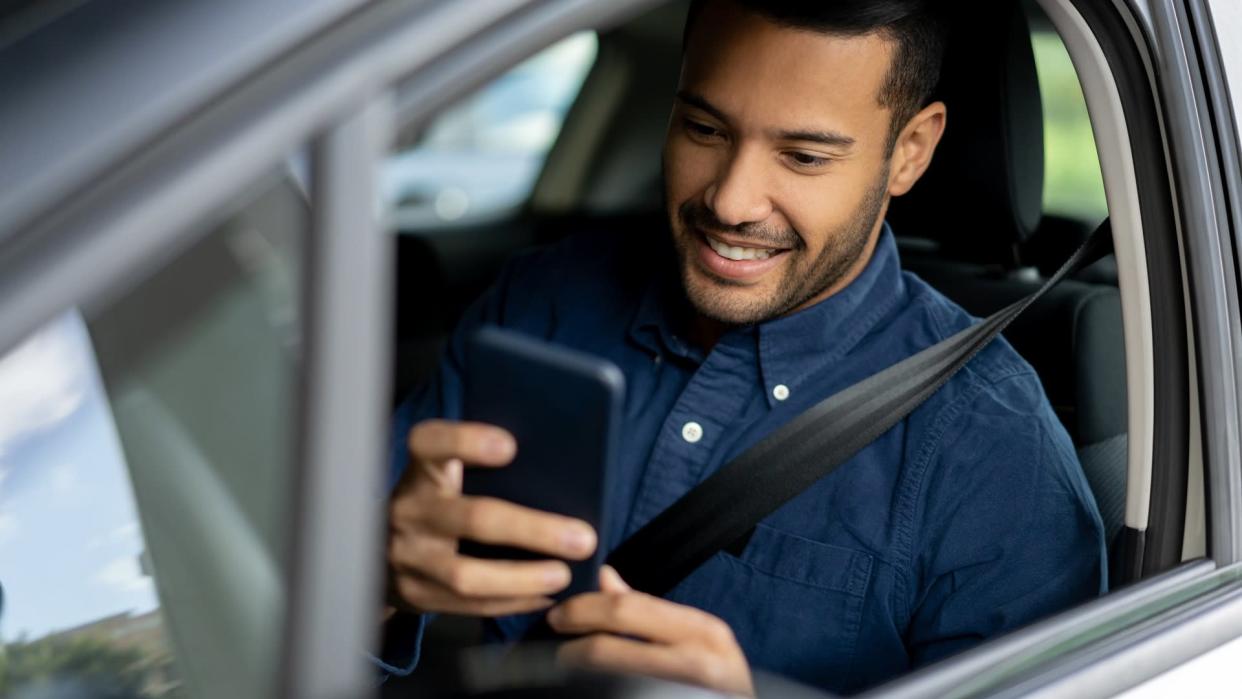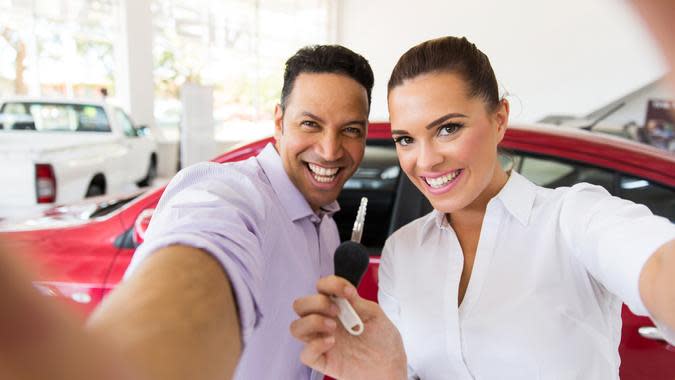[ad_1]

Buying a new car is stressful no matter how many times you’ve done it before. From figuring out your budget to finding the right car to wrapping up all the paperwork, there’s so much involved. And then there is actually paying for the car.
See: 28 Tips for Negotiating With Car Dealers
Read: Cost To Own a Car for a Year in Every State
If you’re looking to save on the cost, these 30 car-buying tips can help you win the negotiation and save money. Before even setting foot in a dealership, make sure you’ve put yourself in a position to leverage the best car deal possible and not get suckered into paying for something useless.

1. Do: Consider the Type of Car You Need
There’s no shortage of different kinds of cars for sale, so the first thing to consider is how you’ll use your car. You might want to buy a dream car but it might not fit your lifestyle. Evaluate your family’s needs, the demands of your commute and the vehicle’s central purpose before narrowing down your selection.For example, if you have a family of six, you’re going to need a vehicle with more seating than a typical sedan. Or, if you have a long commute every day, you might need a car with better gas mileage.

2. Don’t: Neglect Your Research
The only way to figure out how to buy a car is to do your homework. Research isn’t always the fun part of buying a car, but it might be the most important. Read reviews and look into different brands, models, and financing options online before you even visit a dealer.Keep in mind that visiting a dealer at all is likely to require an appointment, depending on dealer policy and virus restrictions in your community. Many dealers have upped their online shopper-assist and remote communication offerings, and some provide no-visit test drives where the sales rep brings the car to you.

3. Do: Get Preapproved
When you get approved for financing before you enter negotiations with a dealer, you force the dealer to match or beat the rate your bank or credit union has already offered, which gives you a bargaining chip to enter negotiations.

4. Do: Identify the Fair Market Value and Average Selling Price
Use a widely accepted source
like Kelley Blue Book to find out the fair market value and average selling price of the car you’re considering. When car dealers know you’ve done your homework, they are more likely to offer their best deal first.

5. Do: Consider Total Cost of Ownership
Buyers tend to be preoccupied with new car prices, and the cost of secondhand cars, for that matter. Every car costs more than the sticker price indicates. It’s up to you to explore every fee and cost associated with the vehicle you’re considering, including loan payment amounts, gas, insurance, and maintenance.

6. Do: Know Your Credit Score
There is a direct correlation between your credit score and the loan you’ll be able to secure. Your FICO credit score, which ranges between 300 and 850, is an approximate representation of the risk you pose to lenders.”Before ever visiting a dealership, a car buyer needs to know what his or her credit rating is and how that will impact the financing options,” said Karl Brauer, former executive publisher at COX automotive. “The best way to do this is to get a report from one of the major credit-tracking companies.”Equifax, Experian, and TransUnion can provide your credit report and score.

7. Do: Raise Your Credit Score
Use the time you’re car shopping to boost your credit score. “A better credit score will mean better financing terms and lower interest,” said Brian Moody, executive editor at Autotrader.”The ads people see on TV for low lease payments or low-interest rates all have fine print — that fine print says ‘for buyers who qualify.’ Translation: buyers with excellent credit,” said Moody. One of the fastest ways to quickly boost a score is to pay down credit card debt because credit-card utilization carries a lot of weight with credit reporting agencies.

8. Do: Shop Within Your Budget
Your shopping strategy must be based on deciding among the cars you can afford, not the cars you want. “The most common mistake is buying a car that’s too expensive given the shopper’s budget,” Moody said. “The best way to combat this is to work out a budget, figure out what cars or what kinds of cars are within your budget and start there.”

9. Don’t: Confuse Shopping With Buying
Shopping and buying are separate phases. They each have different purposes and require different strategies.”Shopping is when you set aside time for research, [a] test drive, etc.,” Moody said. “During that time you’re just evaluating the various cars. Once you’ve decided on one car, return to the dealership that has the car you like on a separate occasion and let them know you’re ready to buy. Shopping is not buying.”

10. Do: Shop in Two Phases
Although shopping is a separate phase from buying, it contains two steps of its own. “Think of choosing the car you want as a completely separate exercise from purchasing the car,” said Joni Gray, editor in chief of Autobytel. “Take time and have fun researching options, features, and price to get to your shortlist and test drive two to three cars to come to your final decision.”After shopping for a car, it’s time to shop for auto financing. “Then, get back to your computer after your decision is made and start researching the finance options your selected dealers are offering,” Gray said.

11. Do: Shop Different Dealerships That Have the Same Brand
Dealerships that share a brand name often have different inventories and different prices or deals. Don’t assume the new cars you’re shopping are the same at two dealerships — even if they’re both local.”Shoppers should always cross-shop dealerships of the same brand in their town,” Moody said. “If you know you want a Ford Fusion, be sure to ask two or three local Ford dealers for their best price and give the other dealerships a chance to beat it.” The concept holds used cars for sale as well as new cars.

12. Do: Consider Certified, Pre-Owned Vehicles
Cars lose value quickly, even if they haven’t sustained a lot of wear and tear and are still in great shape. If a certified, pre-owned vehicle has low mileage, the previous owner has likely swallowed the cost of depreciation for you without beating up the car.


14. Do: Work Your Contacts
Word of mouth is still one of the most reliable forms of advertising. Leverage your networks both in real life and on social media. Many people will be more than happy to share their good experiences with dealerships — or vent about their dreadful ones.”Buying a car is like searching for a job,” said Sanjay Salomon, staff writer for Boston.com. “When you’re looking, you should turn to your network of family, friends, and coworkers. Maybe someone in your circles can connect you with someone who can help you make the best possible decision for getting the right set of wheels.”

15. Don’t: Let Price Be the Only Factor
For most people, the price is a major determining factor when buying a car — but don’t let it be the only factor. Sacrificing quality for the price is likely to cost you more money in the long run.”The biggest mistake people make when purchasing a car is they buy for price — not for quality,” according to CarMax. “Make sure the vehicle has gone through a rigorous quality inspection so you can feel confident it will last for the long haul.”

16. Do: Buy Online to Save Time
Many shoppers are hesitant to buy online because a car is something they want to see up close before they decide. But buying online can open up an enormous range of options that no dealer could fit in a lot.Today, the online car-buying process is easier and more accessible than it’s ever been as dealers and automakers across the country have taken great strides in accommodating legions of online buyers who would likely have been traditional, in-dealership buyers before the pandemic.

17. Do: Check Social Media
One thing that might help you score a great deal — or get some features added to your vehicle you wouldn’t know about otherwise — is to check social media. Check Twitter and Facebook for special deals or incentives dealerships post to attract buyers.

18. Don’t: Forget About Promotions and Rebates
Other than Twitter and Facebook, dealers might offer special incentives or deals right at the dealership that they haven’t advertised anywhere else. You might get special savings just by asking — from rebates to online discounts and more, always ask about special promotions.

19. Do: Test Drive More Than One Vehicle
Don’t fall in love at first sight. When you test drive a car, it might feel like the perfect fit — but you have no frame of reference if you don’t compare it with similar models. Test drive many different vehicles — makes and models — to find the kind of car you really want. Shop around for dealers that offer concierge test drive service to have a sales rep bring the test drive to you.

20. Don’t: Show Your Hand
Like a game of poker, don’t reveal your cards until you have to. If you tell the dealer what you hope to pay each month, you hand over your leverage.”It is never a good idea to reveal the payment you are looking for at the dealership,” Gray said. “This will almost always lead you to take a loan on for more years than is viable.”

21. Don’t: Rely on Dealership Financing
Typically, dealership financing isn’t the best because dealers like to make money through their financing departments. Shopping around for financing is just as important as shopping around for cars. Generally, credit unions offer the lowest interest rates.

22. Don’t: Just Focus on Monthly Payments
Most people go into the buying process knowing roughly what they can afford to pay each month. But fixating on monthly payments can cause you to ignore important considerations or cost you hundreds or even thousands of dollars.”Most people have an ideal monthly payment in mind and try to focus on this at the dealership,” said Ron Montoya, senior consumer advice editor for Edmunds. “Problem is, you lose track of the other important aspects of the deal. You need to know the purchase price of the car, interest rate, term of the loan and what you’re being offered for the trade-in.”

23. Do: Ask For Perks When the Price Won’t Budge
Sometimes it’s simply not possible to get a dealer to come down on the sticker price. But that doesn’t mean you can’t save money.”Even if your dealership isn’t willing to budge on the price of the car … ask for other perks like free oil changes, accessories or regular car washes,” Moody said. “This way, you can save money without getting the dealer to come down on the car’s price.”

24. Don’t: Let Dealers Shop Your Application
Even if they’re doing it to try to get you the best rate, dealers can inadvertently harm you by shopping your application to too many lenders at the same time. “Think twice about letting the dealer pull your credit report and shop your application,” said Gerri Detweiler, credit educator and education director at Nav, Inc.”We’ve heard reports from consumers who have found 10, 25 or more inquiries on their credit reports as a result of one dealer blasting their applications to numerous lenders. While some credit scoring models don’t count all car loan inquiries in a short period of time, not all have this buffer,” Detweiler said.

25. Do: Buy at the End of the Year
As the year winds down, dealers are looking to dump their remaining inventory in anticipation of receiving the new year’s models, which makes early winter a great time to shop for deals. “Most bargain hunters know the end of the year is a good time to get a deal on a car,” said Christian Gulliksen, former senior editor of CarsDirect.”But if you’re buying a Mercedes-Benz or a BMW, there is another reason to put off a purchase until December. For the last few years, this is when the sales battle between Germany’s premium brands has climaxed in a burst of incentives,” said Gulliksen.

26. Do: Ask Questions and Know What You’re Signing
Before you sign anything, make sure you’ve asked enough questions so that you’re not unsure about every aspect of the deal. If the dealer is at all reluctant to answer questions or you feel like you’re being rushed into signing, walk.

27. Don’t: Forget About Extra Fees
Don’t learn about extra fees after you sign. It is your job to factor in “hidden” expenses beforehand.”Tax, title and license fees can possibly add thousands of dollars to the amount you finance,” Gray said. “After you get quotes for the price of your car, do the research on the cost of licensing in your state, the sales tax in your state, city, and county and the documentation fee — which also varies from state to state. After that, you’ll know the real amount you’ll be financing.”

28. Do: Consider How Long You’ll Keep Your Car
The value of your car drops the moment you drive it off the lot. But that doesn’t mean that’s when it’s worth the most to the owner.”The truth is, it’s never worth more to the owner than when it’s paid off because only then do you reap the return on the investment you made by financing it,” said Joe Wiesenfelder, executive editor of Cars.com. “Repair costs can be troubling because they’re unpredictable and come as lump sums. But the reality is that $2,000 a year in repairs for a car that’s paid off is still considerably cheaper than a new car note.”

29. Don’t: Get Impatient and Rush the Process
Car buying can be an arduous, difficult process, and it’s natural to get frustrated and settle for something that is just “good enough.” But doing this will almost always lead to buyer’s remorse.”Don’t rush the purchase,” Montoya said. “Many people want to do it all in an afternoon. Test drive one day, compare prices another day, then close the deal on the third day.” If you rush through the car buying process, however, it could end up costing you more than you can afford — or you could just end up unhappy.

30. Do: Take a Selfie With Your New Car
Once you find the best car for your needs and sign the paperwork, show it off. Take a selfie with your new car and post it on Instagram. Let the world know you got a good price on a great vehicle — then drive off into the sunset.More From GOBankingRates2022 Stimulus Checks: Is Your State Giving Out Money This Year?
Nominate Your Favorite Small Business To Be Featured in GOBankingRates’ 2022 Small Business Spotlight
What To Do With Your Money During High Inflation
17 Biggest Budgeting Mistakes You’re Making
Jamie Young contributed to the reporting for this article.
This article originally appeared on GOBankingRates.com: 30 Biggest Dos and Don’ts When Buying a Car
[ad_2]
Source link
